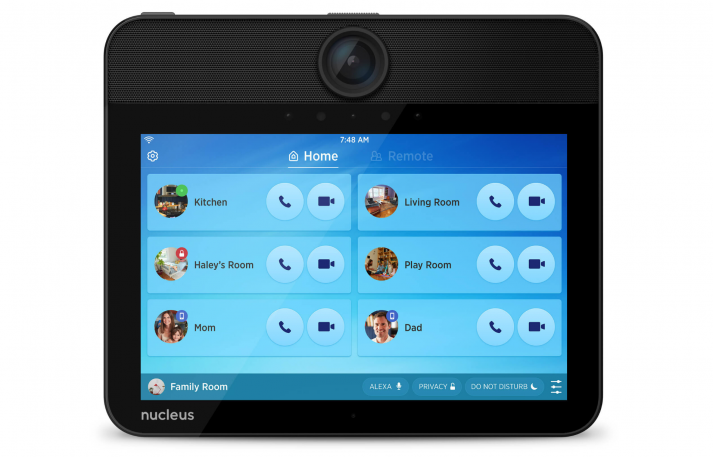A couple of months ago, Nucleus cofounder Morley Ivers believed his smart intercom startup was enjoying a “real partnership” with Amazon. Nucleus had received a major investment from Amazon through the Alexa Fund, which helps propel companies that use its voice command services, and Nucleus reciprocated by giving Amazon insights into its hardware development and user behavior. The intercom was even going to be the first non-Amazon device with visualized responses from Alexa.
Everything changed for Nucleus on Tuesday, when Amazon announced the Echo Show, a $230 smart-home device with a touchscreen, premium speakers, and a front-facing camera. Its headline feature is the ability to make video calls to other Echo Show users, just like Nucleus does with its own intercom. Now, Ivers is wondering how his startup and its 29 employees will survive.
“We feel a little bit like a guinea pig today,” Ivers says, “and yesterday’s announcement sure makes it feel like the guinea pig wasn’t put back into the field. It was put out to be euthanized.”
It’s not unusual for big tech companies to absorb ideas from smaller companies on their platforms, crushing them in the process. (There’s even a long-standing industry term for it.) What sets Nucleus’s situation apart is how the startup worked directly with Amazon to help the Alexa platform grow stronger. Even if Nucleus was naïve in that regard, its story could give chills to other startups who’ve taken money from Amazon and bet their future on the company’s voice services.
Aiding Alexa’s Arms Race
Although Amazon’s own Echo devices get most of the attention, the company has a longer-term strategy of trying to get its underlying Alexa assistant onto many more devices, including lamps, thermostats, fridges, phones, and even car dashboards.
Ivers says that Nucleus contributed to the guidelines that those devices must follow. When Nucleus started developing its Alexa support, there was no certification program for devices with far-field voice recognition, which lets a gadget understand spoken commands from a distance. To hash things out, Nucleus engineers would visit Amazon’s Lab126 hardware group in Silicon Valley and provide feedback.
“The prerequisite program and platform to have all that did not exist prior to us,” Ivers says. “So very specifically, our team on our engineering side put … an untold number of hours into helping with the development of that by providing feedback, and counsel, and thoughts.”
Nucleus also held nothing back in discussing what it had learned about intercom-based video chat, including how its software worked, the challenges the company was facing, and its approach to user privacy. (Ivers stops short of accusing Amazon of intellectual property theft, but notes that Nucleus has some broad patents around Wi-Fi intercoms that it’ll take a look at “when the dust settles.”)
https://www.youtube.com/watch?v=CQP6ie-M_5w
Nucleus also shared data about usage, such as the average number of intercoms that Nucleus owners set up in the home. “When you’re a real partner, you share openly, and you try to build trust by sharing and not holding back, and that is the approach that we took,” Ivers says.
Still, that openness didn’t flow both ways. Although Nucleus learned in advance that Amazon was working on communications between Echo speakers, Amazon declined Nucleus’s request to work on interoperability before launch. And until Amazon announced the Echo Show on Tuesday, Nucleus had no idea that Amazon was working on a device with a video chat component.
Words Of Warning
Ivers argues that other Alexa Fund companies should be on guard, and that startups should think twice before taking money from Amazon. Since Tuesday, he claims to have already heard from a startup founder who’s having second thoughts about applying to the Alexa Fund.
“I think about Stuart Lombard at Ecobee,” Ivers says, referring to the CEO of a smart thermostat company that just announced an Alexa-equipped model and has future plans for an Alexa light switch. “What in the world is stopping Amazon from launching ‘Amazon Feel, the new way to control temperature in your home?’ How can you answer that question?”
Ivers also points to Ring, a maker of smart doorbells that joined the Alexa Fund in mid-2016. “They have an incredibly appealing and awesome mass-market doorbell,” Ivers says. “How do we know that the next thing Amazon does is they don’t launch ‘Amazon Chime, the perfect way to greet visitors at your front door?'”

“The litmus test is, if you’re the CEO of an Alexa Fund company, and you have traction … you’ve got to be questioning what’s going on, and be asking very serious questions,” Ivers says.
Despite those concerns, Ivers doesn’t believe Amazon was trying to bury his company on purpose. He had a “very direct call” with the company on Tuesday night, and believes they understand his perspective.
“I do think that they’re good people, and their leadership in particular, they’re good people,” he says. “I think what happened here is they are just moving so fast, and they’re so focused … people didn’t connect the dots and realize what the impact would be on us.”
As for what’s next for Nucleus, Ivers is still hoping Amazon will make amends and send a more encouraging message to other Alexa Fund companies. He’s not sure exactly what that might look like, though he mentions further investment, a promise of interoperability with Alexa’s voice chat features, or an acquisition as possibilities. It’s unclear, however, whether Amazon feels the same sense of urgency that Nucleus does.
“They have an opportunity, a very, very short window to respond to the marketplace, to the ecosystem, to the entrepreneurs, and say, ‘We didn’t connect the dots. This was a mistake, and we’ve made it right,'” Ivers says. “And I would take that call in a heartbeat.”
Recognize your brand’s excellence by applying to this year’s Brands That Matter Awards before the early-rate deadline, May 3.
